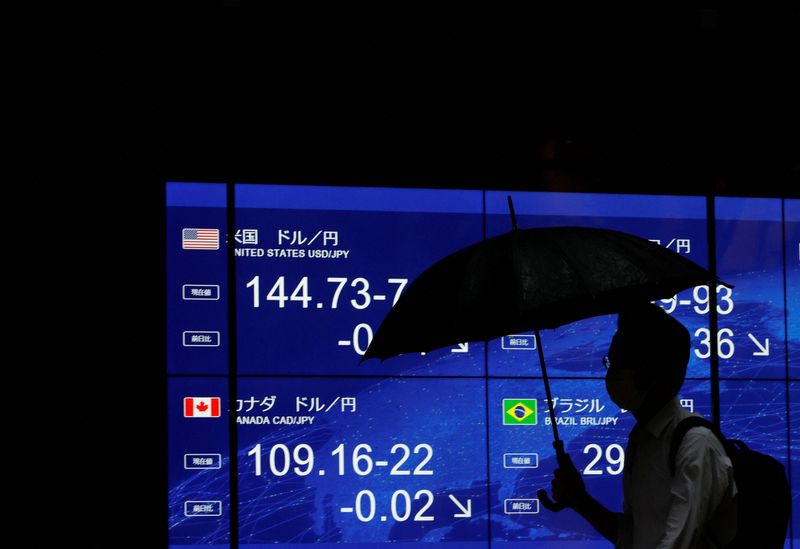By Jamie McGeever
ORLANDO, Florida (Reuters) -The yen's slide below 150 per dollar has fired up warnings from Japanese officials that the pace of depreciation is "excessive" and "undesirable," but a repeat of the yen-buying intervention frenzy of 2022 seems unlikely.
Tokyo may not intervene at all.
Its tolerance for a weaker exchange rate may be greater now than it was then, lower yen volatility points to a pretty relaxed FX market, and U.S.-Japanese yield spreads are probably more likely to narrow than widen from here.
In Japan, inflation has peaked and is now falling, pipeline price pressures have cooled significantly, the economy is in recession, and the country's terms of trade have improved from 2022.
What's more, the Bank of Japan still appears to be on track to end negative interest rates soon, so a "natural" turn in the yen is a distinct possibility.
Globally, while there may be increasing uncertainty around the timing and extent of the next interest rate moves by the Federal Reserve, European Central Bank and Bank of England, they will almost certainly be lower.
None of that points to as pressing a need for policymakers in Japan to wade into the market spending tens of billions of dollars to prevent the yen from making new historic lows through 152 per dollar.
NO HURRY
To be sure, they may want to prevent the yen's slide from spiraling into a more damaging selloff that threatens the functioning of Japanese financial markets. It is already down a hefty 6% against the dollar this year.
But a re-run of September and October 2022 when Japanese authorities bought yen in the FX market for the first time since 1998, and in record quantities, is a remote prospect.
Annual consumer inflation at that time was above 3% and rising, and producer price inflation was a sizzling 10%. While authorities had for years been trying to escape deflation, an exchange rate/import price spiral was never the desired alternative.
Inflation is close to the BOJ's 2% target and slowing, and producer price inflation has virtually disappeared. Analysts at Morgan Stanley note that Japan's terms of trade are not as bad as they were 16 months ago and import costs are nowhere near as high.
This comes against the surprise news that the economy has slipped into recession, meaning Japan is no longer the third-largest economy in the world.
Will policymakers want to drive up an exchange rate that is currently giving the export-heavy economy a path out of recession, boosting corporate profits, and thereby increasing the prospect of higher wage settlements they want to see?
"Our suspicion is thus that the Kishida administration ... will be in no particular hurry to curb the yen's slide and thereby risk depressing corporate profits," Morgan Stanley's Koichi Sugisaki wrote on Sunday.
ORDERLY FX MARKET
If the domestic backdrop suggests less need for Japan to wade in with huge yen-buying intervention, so too does the international picture.
In 2022 the Fed was undertaking its most aggressive rate-hiking campaign in 40 years and U.S.-Japanese yield spreads were widening sharply. The dollar's surge above 150.00 yen was in line with exploding rate differentials.
Intervention, therefore, maybe flew in the face of these fundamentals, but was understandable from the point of view of wanting to prevent the yen-selling mania from spiraling out of control.
Today, the Fed has almost certainly topped out, U.S. yields are more finely balanced, and the BOJ is nearer "liftoff." The yen may benefit from a natural narrowing of the U.S.-Japanese yield gap, without an official push.
The risk for the BOJ is if its G4 peers don't cut rates as quickly or as much as predicted. The yen could come under renewed downward pressure, testing the central bank's intervention resolve.
But right now, currency markets appear perfectly relaxed. Despite falling every week this year, the kind of one-way market that Japanese officials want to avoid, the yen's decline has been anything but volatile.
One-month and three-month implied dollar/yen volatility is at three-month lows around 7% and 8%, respectively, notably lower than in September and October 2022.

"The risk of material intervention is still modest," said Marc Chandler, managing director at Bannockburn Global Forex.
(The opinions expressed here are those of the author, a columnist for Reuters.)
(By Jamie McGeever; Editing by Paul Simao)